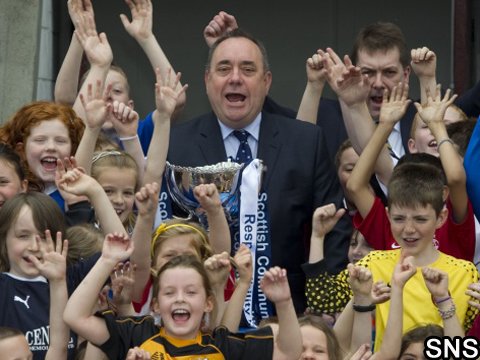 The Right Honourable Alex Salmond, MSP, took time out from running the country to answer questions on this season’s Scottish Communities League Cup, Cristiano Ronaldo, Willie Bauld and the work football clubs carry out in their communities.
The Right Honourable Alex Salmond, MSP, took time out from running the country to answer questions on this season’s Scottish Communities League Cup, Cristiano Ronaldo, Willie Bauld and the work football clubs carry out in their communities.
You spoke almost two years ago in the SFL Newsletter about a family memory from the League Cup Final between Hearts and Kilmarnock in season 1962/63. Has the importance of that game, the occasion, and the fact that you were able to enjoy it with family grown over the years?
I think the significance of important events from your childhood always grows over time as you get older and look back more fondly on what has gone before. That occasion is still seared into my memory as it was one of my first visits to Hampden Park. I suppose I remember it so vividly because Hearts won and there haven’t been quite as many glorious visits to the National Stadium for the Jambos as I – or my family - would have liked since then! Last year’s Scottish Cup Final was certainly memorable, but even the famous 1998 Scottish Cup win wasn’t at Hampden – it was at Celtic Park.
What memories would you like fans to take away from this season's Scottish Communities League Cup Final?
Well, both sets of fans would obviously love to see a win for their team, but the main thing is, whatever the result, all of the supporters should just try to enjoy the day. For both clubs, a visit to Hampden for a Cup Final is really a thing to savour and I just hope we get a good game of football that everyone will be talking about for years to come.
Sir Alex Ferguson recently compared Cristiano Ronaldo's heading ability to that of Willie Bauld who scored a hat-trick for Hearts in the 1954 League Cup Final win over Motherwell in the rain at Hampden. Did your father tell you how good Bauld was at heading the ball or did you ever see him do that for himself.
I have to say, I would take Willie Bauld over Cristiano Ronaldo any day! The Real Madrid star is a great header of the ball, as his recent goal in the Champions League against Manchester United proved, but I would contend it is significantly easier to head the footballs of today than the balls that Willie Bauld and his colleagues had to deal with. They were heavy, durable leather specimens with a lethal lace-up section that must have really hurt if you caught them wrong. If Willie Bauld could head an old-style leather lace-up football to such great effect, imagine what he could do today!
I do remember my Dad taking me to a match in the early Sixties in which ‘the King’, Willie Bauld, played in and scored. I was actually disappointed as my father had told me that Bauld had recently scored from the half way line and I spent the whole game expecting him to do this again.
The competition was backed by the Government two years ago with one of the aims being the promotion of the activities that football clubs carry out in their communities. How far do you feel this promotion has gone?
 The Scottish Government is a big supporter of Scottish football and we can see the great work that clubs the length and breadth of the country are already doing in their communities. But with Henry McLeish's report on Scottish football last year, there was a recognition that, with the right support, there was the potential for many clubs to do so much more. To help bring this to life, a part of our £1.8m support package for the SCLC was specifically designed to support all 42 clubs in the development of their community engagement programmes. This is helping them build on all the positive work clubs were already doing in the community and the trophy tours have helped shine a light on some of that work, by bringing the cup to the fans.
The Scottish Government is a big supporter of Scottish football and we can see the great work that clubs the length and breadth of the country are already doing in their communities. But with Henry McLeish's report on Scottish football last year, there was a recognition that, with the right support, there was the potential for many clubs to do so much more. To help bring this to life, a part of our £1.8m support package for the SCLC was specifically designed to support all 42 clubs in the development of their community engagement programmes. This is helping them build on all the positive work clubs were already doing in the community and the trophy tours have helped shine a light on some of that work, by bringing the cup to the fans.
What Community projects do you feel that the football community should be particularly proud of supporting?
I think any project that allows clubs to engage with their community is to be celebrated. A number are helping young people in their local area develop the skills and experience they need to find sustainable employment through a series of training course.
We are working with clubs and other bodies such as Skills Development Scotland to see where we can develop this brilliant initiative further, for example, through support for the soon to be launched Certificate of Work Readiness.
Another example is the assistance clubs give to our senior citizens who are living with mental illness such as Alzheimer’s by encouraging them to discuss their favourite football memories in an effort to stimulate them and even just lift their spirits. Along with the more traditional kids football coaching courses, these initiatives are helping to improve the lives of people all over Scotland.
When this season's competition was launched, you felt that the Government's backing was 'a Declaration of Faith' in the game in Scotland. Has that declaration been worthwhile?
No-one can deny that Scottish football is going through a transition period at present, with a number of challenges, both on and off the field to be addressed. Every Scottish football fan – myself included – hopes that the footballing authorities and everyone involved in the game in this country can work together to plan for a successful future. Our backing of the conpetition was a powerful way of demonstrating that the Scottish Government stands ready to support that planning and help the development of the game in any way it can.
At the launch, you also said that 'If everyone can put their shoulder to the wheel, then at the end of this season, we may well see a lot of positives for Scottish football.' - Do you see some positives coming through?
Yes I do. I think this season there has been a real focus on what football clubs mean to the communities in which they live. The financial challenges that some of our clubs face has really provoked a number of communities to rally round and support them in times of trouble. Another positive by-product of the recent financial issues Scottish football has faced has been the move by most Scottish clubs to focus on bringing through their young players rather than seek to fill gaps in their team with expensive foreign imports. This season we have seen the emergence of young players such as Gary Mackay-Steven at Dundee United, Andrew Shinnie at Inverness Caledonian Thistle and Celtic’s Tony Watt, who scored a fantastic and memorable goal against Barcelona in this season’s Champions League. In the long-term, that can only benefit Scottish football.
The Commonwealth Games is coming ever closer and, of course, Hampden will be one of the main venues. What is getting done to make the people of Scotland feel involved in the games?
I think we’re already seeing evidence that the people of Scotland are really embracing the Commonwealth Games. The record number of volunteer applications – more than 50,000! - has been phenomenal and those people lucky enough to be chosen to help out during the event are going to have an experience they will never forget.
Alongside that are the tangible changes that the people who live and work in Glasgow are seeing in their city. As we move towards the Games, more and more of the infrastructure required to host the event is being completed. We are working hard to make these as accessible as possible so people can really feel involved in the event and get to know the sporting and other venues that are going to be used in the city for many decades to come as part of the Games legacy.






.png)












